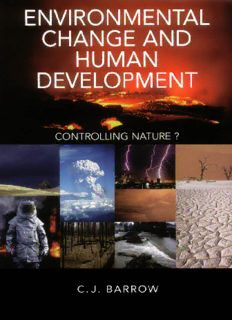
Environmental Change and Human Development: The Place of Environmental Change in Human Evolution (Arnold Publication) PDF
Preview Environmental Change and Human Development: The Place of Environmental Change in Human Evolution (Arnold Publication)
ENVIRONMENTAL CHANGE AND HUMAN DEVELOPMENT This page intentionally left blank ENVIRONMENTAL CHANGE AND HUMAN DEVELOPMENT Controlling Nature? C.J. BARROW School of Social Sciences and International Development, University of Wales Swansea, UK A member of the Hodder Headline Group LONDON Distributed in the United States of America by Oxford University Press Inc., New York First published in Great Britain in 2003 by Arnold, a member of the Hodder Headline Group, 338 Euston Road, London NW1 3BH http://www.arnoldpublishers.com Distributed in the United States of America by Oxford University Press Inc. 198 Madison Avenue, New York, NY 10016 © 2003 C. J. Barrow All rights reserved. No part of this publication may be reproduced or transmitted in any form or by any means, electronically or mechanically, including photocopying, recording or any information storage or retrieval system, without either prior permission in writing from the publisher or a licence permitting restricted copying. In the United Kingdom such licences are issued by the Copyright Licensing Agency: 90 Tottenham Court Road, London W1T 4LP. The advice and information in this book are believed to be true and accurate at the date of going to press, but neither the author nor the publisher can accept any legal responsibility or liability for any errors or omissions. British Library Cataloguing in Publication Data A catalogue record for this book is available from the British Library Library of Congress Cataloging-in-Publication Data A catalog record for this book is available from the Library of Congress ISBN 0 340 76403 1 (hb) ISBN 0 340 76404 X (pb) 1 2 3 4 5 6 7 8 9 10 Typeset in 10/12pt Sabon by Phoenix Photosetting, Chatham, Kent Printed and bound in Great Britain by MPG What do you think about this book? Or any other Arnold title? Please send your comments to [email protected] Contents Preface vii Acknowledgements ix 1 Introduction 1 2 Environmental change before modern humans appeared 32 3 Environmental change during historical times 59 4 Are twenty-first-century humans more vulnerable to nature? 100 5 Ongoing natural threats 123 6 Reacting to environmental challenges and opportunities 166 7 Coping with nature 192 8 The future 204 Glossary 221 References 225 Index 245 This page intentionally left blank Preface This book focuses on environmental change and human fortunes. While there is a large and rapidly expanding literature dealing with how people affect the environment, less attention has been given in recent years to how the environment shapes human development. In an ever more crowded world there is a need for anticipatory environmental management, and a crucial input to this is consideration of the interaction between environment and humans. Nowadays, planners, administrators and the people they serve are often oblivious to the fact that the environment is a key control on the quality of life. In richer nations, people commonly feel that modern technology gives them 'the edge' over nature to a degree never enjoyed before; and in poorer countries established ways of coping with natural challenges have often broken down, and new technological solutions are beyond easy access. City folk overlook the fact that each modern high-rise building, towering above a hectare plot (or less), has enormous 'roots' stretching out to oil-fields, many square kilometres of croplands, ocean fisheries, cattle ranches, rivers and reservoirs, and so on - all dependent upon and vulnerable to nature. The environment is not as stable, benign or controllable as many like to think. The world population is vastly larger than it ever has been and is still growing, and humans increasingly upset nature through pollution and other activities. While modern communications may help environmental managers, rapid travel also increases the dispersal of diseases and pests. Technological advance and social development are not all beneficial; some innovations have the effect of making people more vulnerable to disruption by natural disaster, and citizens are often less able to cope with and adapt to changed conditions than people were in the past. In the modern world there is, in practice, relatively limited interest from governments and voters in anticipatory studies, contingency planning and adaptive strategies. Over the past few decades there has been some shift towards concern for environmental issues, stimulated by fears about global warming, stratospheric ozone depletion, pesticide pollution and, by the late viii Preface 1990s, El Nino events and the associated forest fires in Southeast Asia and Latin America, and flooding in the UK; however, the focus has been mainly on how humans are affecting the environment, and much less on how the environment can affect humans. This book, I hope, will help prompt con- sideration of the latter, and development that includes vulnerability reduc- tion, and improvement of flexibility and adaptability. There are three sections in this book: the first (Chapters 1 to 3) deals with debates about environment-human interaction, the attitudes people have towards the environment, and past environmental impacts; the second section (Chapters 4 to 5) focuses on recent and ongoing changes, asking whether we are more or less vulnerable than in the past; section three (Chapters 6 to 8) reviews likely future challenges and explores how to ensure a more secure, as well as materially improved human future. Inevitably there is a tendency to report past catastrophes and to flag threats, but I am also keen to identify opportunities and strategies to improve the chances of achieving better human welfare. Chris Barrow University of Wales Swansea Swansea, UK May 2002 Acknowledgements I wish to thank the editorial team at Arnold, in particular Liz Gooster and those who kindly read my draft. I am also most grateful to staff of the Inter- Library Loans Office, University of Wales Swansea.
